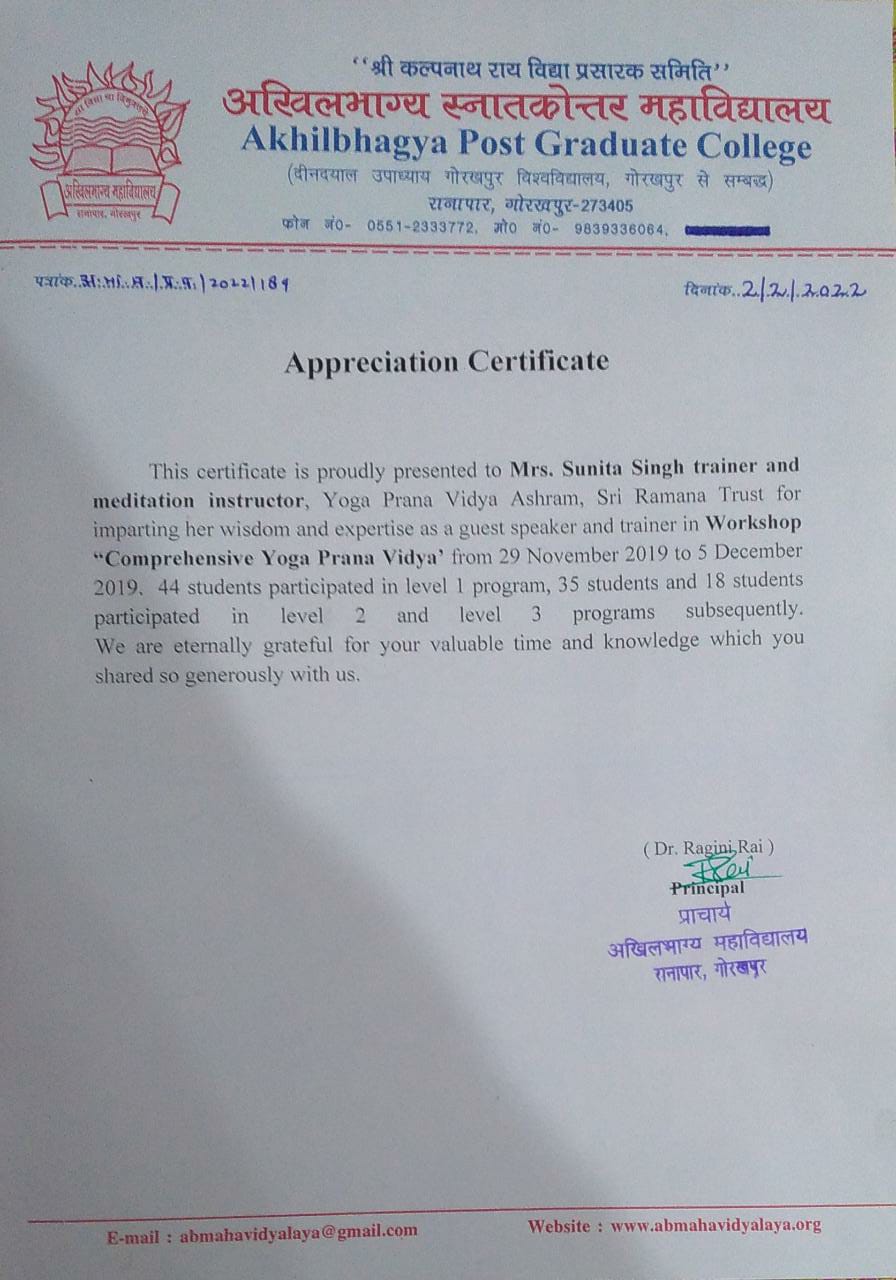Effects of Yoga Prana Vidya intervention on psychological wellbeing and criminal attitude of under-trial prisoners

Effects of Yoga Prana Vidya intervention on psychological wellbeing and criminal attitude of under-trial prisoners
Journal Title: “Effects of Yoga Prana Vidya intervention on psychological wellbeing and criminal attitude of under-trial prisoners.”
Authors:
- Venkata Satyanarayana Nanduri, Consultant, Research & Publications, Yoga Prana Vidya Ashram, Sri Ramana Trust, Doddabbanur, Thally, Tamilnadu, India
- Revathi Ram, Yoga Prana Vidya, Practitioner and Inspector of Police, KSPS, Chitradurga, Karnataka, India
Abstract :
- Background: It is a general notion that rigorous isolation and custodial measures would reform the offenders of Law. Experience, however, contradicts this expectation and often imprisonment had the opposite effect. This study was conducted to test whether a known system of Yoga Prana Vidya (YPV) intervention can be applied for prisoners to increase their psychological well-being (PWB) and reduce the criminal attitude (CATS).
- Materials & Method: Pre and Post-test without control group design was adopted for the present study. A mixed method was used to collect the data to see the effect of a 3-month YPV intervention on 30 under-trial prisoners. For Quantitative part of study Psychological well-being (PWB) and Criminal Attitude Test (CATS)were used before and after the intervention. Statistical analysis was conducted using IBM SPSS. Qualitative research interviews were conducted on 10 participants out of the 30 and the interview notes were analyzed.
- Results: Statistical analysis of quantitative data showed that there was a significantly positive change in the PWB and CATS parameters after the intervention. The qualitative analysis yielded four themes:
- YPV is a positively Life-changing phenomenon, easy to practice daily,
- Clear Intention to sustain YPV practice after release from jail,
- Desirous of promoting, helping and recommending YPV to others to learn and practice, and
- Some challenges experienced by participants in the intervention.
- Conclusions: YPV intervention produced positive results for prisoners who practised regularly. It is recommended that Government agencies and Social Workers may consider these findings for appropriate implementation of YPV in their Prison reform efforts for reducing crime rate and recidivism.
YPV Sadhana App
Download YPV Sadhana app to boost immunity, emotional balance and positive attitude towards life.
Yoga Prana Vidya Ashram Sri Ramana Trust Hosur – Thally Main Road Near Ubbanur Lake Thally, Krishnagiri Dist Tamil Nadu – 635118, INDIA
Contacts
Disclaimer :
Yoga Prana Vidya is not intended to replace other forms of healing modalities including allopathy and it is also complementary including alternative.
In case of Severe or Persisting symptoms, refer to a medical doctor and or a Certified Yoga Prana Vidya Healer.
“Currently we do not have any connection / affiliation / association with and are not authorised / represented / endorsed / certified / maintained / sponsored by Master Choa Kok Sui and/or organisations established by the Master and/or subsidiaries / affiliates of such organisations.”

Dhaval Dholakia is a certified YPV healer for 16 years. He is also a mechanical engineer and has worked in Plastic Processing Machinery for 25 years. He resides in Ahmedabad.
Dr. S. K. Singh is a Arhat Trainer having more than 20 years of YPV healing and teaching experience. He is also trained in Kriyashakti & Fengsui and completed the one year intensive program in 2016. He has organized many higher level YPV training workshops and retreats. He completed his Master’s degree in Science and has a doctorate in Environmental Biology. He hails from Varanasi.

Madhu Sudhir is a senior YPV trainer since 2004. She has trained over 2500 students and more than 50 trainers who are also propagating YPV practices. She has done YPV healing for more than 7000 people since 2006. She is the secretary of the Mysore YPV Healers Association since 2011. She is also associated with JSS University – Dental College as a guest lecturer for “Holistic wellness through YPV” for BDS 1st year students. She has also conducted various seminars on YPV teachings. She graduated in commerce from Bangalore University and also has a diploma in architecture. She also works as a Vaastu consultant for businesses, constructions, plots & houses.
Raghu N is a Arhat Trainer having over 22 years of YPV healing and teaching experience. He founded “Master YPV Trust Nanjangud” in 2019 and conducting regular service activities through this trust in his role as President. He also started the first independently located YPV centre in Nanjangud in 2014. He has previously attended the one year Spiritual Intensive Program for 2015-16 conducted in Sri Ramana Trust Ashram. He also has 7 years of experience working as a secretary at “Mysore YPV Healers Association” during which he nurtured many healers. Raghu conducts teachings in Kannada, English and Hindi languages. He has also completed a B.Sc. and B.Ed. from the Mysore University.


1: Name : Lakhsmi Devi

1. Name – Vishakha Karnani
2. address/ centre – 316, Sai Kripa Colony,
Indore 452002, Madhya Pradesh
3. educational qualification – B.A. Loreto College, Kolkata. Then worked as a photo journalist & a freelancer (children photography)
4. any paper presentation – COVID 19 case report in Innovative publication journal. July 2020
5. any specific achievements – part of the organising team in the first SIP , Pune, 2015. Thereafter involved in organising public darshan and Compassionate Parenting and nurturing programs in various cities like Indore, Nagpur, Raipur, Pune, Kolkata and Ichalkaranji (kolhapur)
6. Since 2006. Got introduced to the world of energy in Kolkata and shifted to Indore in 2008 to spread the work in Central India. Currently working in M.P, Chattisgarh, Maharashtra, Rajasthan, North East India.
Radha Ganesh is presently working for Yoga Prana Vidya Organization as Senior Arhat trainer and Ethics committee member. She is a Senior Arhat Trainer and certified YPV healer with over 18 years of experience. She completed the one-year spiritual intensive program at the YPV ashram in Thally. She has been trained in basic, advanced healing and psychotherapy at World Pranic Healing. Radha worked in Unnathi Healing Foundation Trust as a healer and trainer. She also worked in MS Ramaiiah Hospital Pranic Healing Department, Ayush Arogya Dhama. She has taught YPV teachings in several schools and also conducted classes for nursing staff, pharma students among others. She regularly conducts an Arhat Marathon on every last Sunday of the month at Karnataka Pranic Healing foundation trust since last 3 years. Radha has completed her M.A. in English from MG University, Kerala.
Yoga Prana Vidya
| Account Name : | Sri Ramana Trust |
| A/C No: | 566438417 |
| Name of Bank: | Indian Bank |
| IFSC Code: | IDIB000T060 |
| Address: | Police Station Road, Thally, Krishnagiri |















